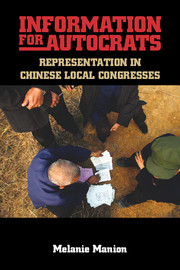Book contents
- Frontmatter
- Dedication
- Contents
- Tables and Figures
- Acknowledgments
- Introduction
- 1 Institutional Design
- 2 Selectoral Connection
- 3 Authoritarian Parochialism
- 4 Putative Principals
- 5 Independent Candidates
- Conclusion
- Appendix A Interviews and Surveys
- Appendix B Reliability Check on Delegate Self-Reports
- Appendix C Searching Independent Candidates on Sina Weibo
- Works Cited
- Index
- Miscellaneous Endmatter
Appendix A - Interviews and Surveys
Published online by Cambridge University Press: 05 December 2015
- Frontmatter
- Dedication
- Contents
- Tables and Figures
- Acknowledgments
- Introduction
- 1 Institutional Design
- 2 Selectoral Connection
- 3 Authoritarian Parochialism
- 4 Putative Principals
- 5 Independent Candidates
- Conclusion
- Appendix A Interviews and Surveys
- Appendix B Reliability Check on Delegate Self-Reports
- Appendix C Searching Independent Candidates on Sina Weibo
- Works Cited
- Index
- Miscellaneous Endmatter
Summary
In addition to published materials, this book relies greatly on qualitative interview evidence and data from original probability sample surveys. These interviews and surveys were conducted over a period of several years, mostly from 2007 to 2009, in Chongqing, Beijing, Shanghai, Hebei, Shandong, Anhui, Hunan, and Zhejiang, as detailed in this appendix.
Qualitative Evidence
Different sorts of qualitative evidence served different purposes in the development of this project. Qualitative evidence includes my direct observation of township congress proceedings in Chongqing, an exploratory survey of township congress delegates in Anhui, and 65 loosely structured interviews I conducted, most of them with congress officials or ordinary delegates in municipal, county, and township congresses in five provinces. Table A.1 identifies the interview subjects by level (where relevant), type of institution, and position in the workplace. By interview, I refer to a meeting arranged explicitly to talk about local congress matters, in which I asked questions and openly took notes. I do not include the many discussions and informal conversations with Chinese over the years in which any of these conditions were absent, although such discussions and conversations certainly illuminated many issues for me.
In January 1999, other participants and I, in a Carter Center delegation to Chongqing, observed direct elections of township delegates and the full first session of a township congress, including discussions among small groups of delegates, candidate nominations, and elections (by delegates) of congress and government leaders. Although we were surely not inconspicuous observers, the congress session did not appear to be a staged performance. During discussions, delegates complained repeatedly about lack of roads connecting some villages to the town, inconvenience of birth control checks for village women, nonresponsiveness of the township government, and poor work style of township government officials. The opportunity to observe congress elections and a full congress session and to interview congress, government, and Communist Party officials, reported in part in Manion (2000), constitutes the first stage of my fieldwork on Chinese local congresses. The Carter Center trip changed my prior view of the congresses as institutionally uninteresting.
In 2004 and 2005, I was able to take up seriously my interest in local congresses. In addition to reading an exciting new empirical literature on the congresses, I interviewed a handful of the key scholars who had produced it.
- Type
- Chapter
- Information
- Information for AutocratsRepresentation in Chinese Local Congresses, pp. 155 - 167Publisher: Cambridge University PressPrint publication year: 2015



